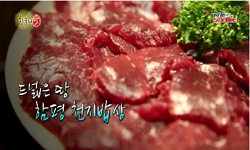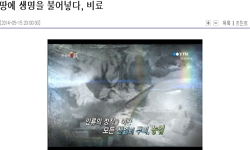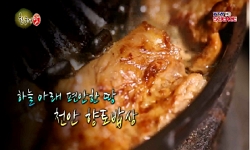This thesis attempts to examine the melodramatic archetype of North Korean novels by re-reading Lee Ki-young’s Land, the first novel of North Korean literature. As you know, the vitality of the democratic reform, such as land reform during the liber...
http://chineseinput.net/에서 pinyin(병음)방식으로 중국어를 변환할 수 있습니다.
변환된 중국어를 복사하여 사용하시면 됩니다.
- 中文 을 입력하시려면 zhongwen을 입력하시고 space를누르시면됩니다.
- 北京 을 입력하시려면 beijing을 입력하시고 space를 누르시면 됩니다.
부가정보
다국어 초록 (Multilingual Abstract)
There are three main points that this thesis gives special insight into by re-reading Land, which has been well read throughout North and South Korea. First, it explores that the vitality of the time for the people who received the land to voluntarily promote private ownership to public value was the cause of enlightenment in itself. Second, it explores that the virtue of the political revolution, in which private interests and public interests are harmonized is the manifestation of melodramatic imagination. Third, it explores why the melodramatic virtue of such North Korean novels was able to establish the melodrama of the Suryoung’s image. In particular, it is through the definite trajectory of self-transformation of Minchon’s “memory” of land reform during the liberation period.
The significance of this thesis lies above all in its insight into the melodramatic virtues of land reform that harmonized private and public interests. Even if you understand others as much as possible, your pursuit of private interests is inevitably self-centered, but the pursuit of the public interest requires treating oneself and others completely impartially. Therefore, the two cannot be reconciled in principle. Recall the dilemma of ethics in which utilitarian ethics and deontological ethics can only antagonize, and the dilemma of democracy in which liberal democracy and social democracy can only antagonize. This thesis has insight into the melodramatic virtues of the special “event” of land reform that temporarily resolved this dilemma. Exploring the broad aspects of the appropriation of these virtues into only Suryong’s image will give a diachronic view of the unique durability of the North Korean dictatorship. This will be a future challenge.
This thesis attempts to examine the melodramatic archetype of North Korean novels by re-reading Lee Ki-young’s Land, the first novel of North Korean literature. As you know, the vitality of the democratic reform, such as land reform during the liberation period, led to the development of the North Korean economy so as to accomplish “socialist transformation” through the nationalization of major industries and agricultural cooperation project. And it also gave the cause of a new revolutionary stage called “building socialism” in the era of Chollima. This thesis intends to look in-depth that this vitality of enlightenment could be a synchronic form before the Juche era, which has pursued the harmony between private interests and public interests through Land.
There are three main points that this thesis gives special insight into by re-reading Land, which has been well read throughout North and South Korea. First, it explores that the vitality of the time for the people who received the land to voluntarily promote private ownership to public value was the cause of enlightenment in itself. Second, it explores that the virtue of the political revolution, in which private interests and public interests are harmonized is the manifestation of melodramatic imagination. Third, it explores why the melodramatic virtue of such North Korean novels was able to establish the melodrama of the Suryoung’s image. In particular, it is through the definite trajectory of self-transformation of Minchon’s “memory” of land reform during the liberation period.
The significance of this thesis lies above all in its insight into the melodramatic virtues of land reform that harmonized private and public interests. Even if you understand others as much as possible, your pursuit of private interests is inevitably self-centered, but the pursuit of the public interest requires treating oneself and others completely impartially. Therefore, the two cannot be reconciled in principle. Recall the dilemma of ethics in which utilitarian ethics and deontological ethics can only antagonize, and the dilemma of democracy in which liberal democracy and social democracy can only antagonize. This thesis has insight into the melodramatic virtues of the special “event” of land reform that temporarily resolved this dilemma. Exploring the broad aspects of the appropriation of these virtues into only Suryong’s image will give a diachronic view of the unique durability of the North Korean dictatorship. This will be a future challenge.
국문 초록 (Abstract)
이 논문이 남북한에서 두루 읽힌 『땅』을 재독하면서 특별히 통찰하는 점은 크게 세 가지이다. 첫째는 『땅』에서 토지를 받은 인민이 자발적으로 사적소유를 공적 가치로 고양하려했던 당대적인 활력이 그 자체로 계몽의 합당한 명분이었음을 탐색하는 점이다. 둘째는 이렇게 사익과 공익이 조화된 ‘지고한’ 체제혁명의 미덕이 멜로드라마적 상상력의 발현임을 통찰하는 점이다. 셋째는 이러한 북한소설의 멜로드라마적인 미덕이 수령형상의 멜로드라마를 정초할 수 있었던 이유를 통찰하는 점이다. 특별히 해방기의 토지개혁에 대한 민촌의 ‘기억’이 스스로 변모하는 확연한 궤적을 통해서다.
이 논문의 의의는 무엇보다 사익과 공익을 조화시킨 토지개혁의 멜로드라마적인 미덕을 통찰한 데 있다. 타자를 최대한 양해해도 사익추구는 자기본위적일 수밖에 없지만, 공익추구란 자기와 타자를 온전히 불편부당하게 대해야만 하는 것이다. 그러므로 이 둘은 원리적으로 조화될 수 없다. 공리주의와 의무주의가 길항할 수밖에 없는 윤리학의 딜레마, 자유민주주의와 사회민주주의가 길항할 수밖에 없는 민주주의의 딜레마를 상기할 수 있을 것이다. 이 논문은 이런 딜레마를 일시적으로 해소했던 토지개혁이라는 ‘특별한 사건’의 멜로드라마적인 미덕을 통찰했다. 하지만 이 미덕을 수령형상이 홀로 전유해가는 광범한 양상을 탐색하는 것은 북한 독재체제의 특유한 내구력을 통시적으로 보게 할 것이다. 이는 향후의 과제가 될 것이다.
이 논문은 북한문학 최초의 장편소설인 이기영의 『땅』을 재독함으로써 북한소설의 멜로드라마적 원형성을 고찰하고자 한다. 두루 알다시피 해방기 토지개혁 등 민주개혁의 활력이 주요...
이 논문은 북한문학 최초의 장편소설인 이기영의 『땅』을 재독함으로써 북한소설의 멜로드라마적 원형성을 고찰하고자 한다. 두루 알다시피 해방기 토지개혁 등 민주개혁의 활력이 주요산업 국유화와 농업협동화 시기 “사회주의적 개조”를 완수하련다는 북한경제의 발전을 견인했다. 그리고 이는 또한 천리마시대 “사회주의 건설”이라는 새로운 혁명단계의 명분도 주었다. 이 논문은 토지개혁의 문학적 현존인 핍진한 『땅』의 ‘기억’을 통해 이렇게 활력 있는 당대적 계몽성이 사익과 공익의 조화를 추구했던 ‘주체 이전’의 공시적 형상일 수 있음을 심층적으로 들여다보려는 것이다.
이 논문이 남북한에서 두루 읽힌 『땅』을 재독하면서 특별히 통찰하는 점은 크게 세 가지이다. 첫째는 『땅』에서 토지를 받은 인민이 자발적으로 사적소유를 공적 가치로 고양하려했던 당대적인 활력이 그 자체로 계몽의 합당한 명분이었음을 탐색하는 점이다. 둘째는 이렇게 사익과 공익이 조화된 ‘지고한’ 체제혁명의 미덕이 멜로드라마적 상상력의 발현임을 통찰하는 점이다. 셋째는 이러한 북한소설의 멜로드라마적인 미덕이 수령형상의 멜로드라마를 정초할 수 있었던 이유를 통찰하는 점이다. 특별히 해방기의 토지개혁에 대한 민촌의 ‘기억’이 스스로 변모하는 확연한 궤적을 통해서다.
이 논문의 의의는 무엇보다 사익과 공익을 조화시킨 토지개혁의 멜로드라마적인 미덕을 통찰한 데 있다. 타자를 최대한 양해해도 사익추구는 자기본위적일 수밖에 없지만, 공익추구란 자기와 타자를 온전히 불편부당하게 대해야만 하는 것이다. 그러므로 이 둘은 원리적으로 조화될 수 없다. 공리주의와 의무주의가 길항할 수밖에 없는 윤리학의 딜레마, 자유민주주의와 사회민주주의가 길항할 수밖에 없는 민주주의의 딜레마를 상기할 수 있을 것이다. 이 논문은 이런 딜레마를 일시적으로 해소했던 토지개혁이라는 ‘특별한 사건’의 멜로드라마적인 미덕을 통찰했다. 하지만 이 미덕을 수령형상이 홀로 전유해가는 광범한 양상을 탐색하는 것은 북한 독재체제의 특유한 내구력을 통시적으로 보게 할 것이다. 이는 향후의 과제가 될 것이다.
동일학술지(권/호) 다른 논문
-
내선결혼과 식민지 남성의 나르시시즘 - 이효석의 『푸른 탑(綠の塔)』(1940)을 중심으로 -
- 한국문학연구학회
- 오태영 ( Oh Tae-young )
- 2021
- KCI등재
-
욕망매개자·희생양에서 충동주체로의 이행 <밤의 해변에서 혼자>
- 한국문학연구학회
- 한귀은
- 2021
- KCI등재
-
- 한국문학연구학회
- 김나현
- 2021
- KCI등재
-
(은유된) 국토와 민중 - 박태순의 국토 기행문을 중심으로
- 한국문학연구학회
- 김우영
- 2021
- KCI등재





 KCI
KCI KISS
KISS






